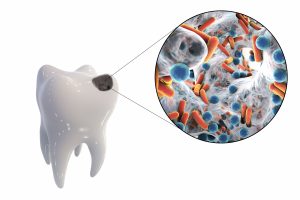What Exactly IS a Cavity? A Restorative Dentist In Hillsboro Explains
December 16, 2018
 Here’s a couple of surprising statistics for you: According to the National Institute of Dental and Craniofacial Research, over 90% of the population has had cavities at some point in their life. And if that weren’t bad enough, an estimated 27% of adults currently have undiagnosed cavities. But although this is a common oral health problem, you still may not know what a cavity actually is. Keep reading to find out more and learn about the best way to protect your teeth. Knowledge is power – and can ultimately minimize the amount of dental work you need from a restorative dentist in Hillsboro!
Here’s a couple of surprising statistics for you: According to the National Institute of Dental and Craniofacial Research, over 90% of the population has had cavities at some point in their life. And if that weren’t bad enough, an estimated 27% of adults currently have undiagnosed cavities. But although this is a common oral health problem, you still may not know what a cavity actually is. Keep reading to find out more and learn about the best way to protect your teeth. Knowledge is power – and can ultimately minimize the amount of dental work you need from a restorative dentist in Hillsboro!
What Is a Cavity?
The word ‘cavity’ is defined as an empty space within a solid object. In regards to oral health, it could be (very simply) defined as a hole in a tooth. But there’s more to it than that.
Cavities occur when bacteria in the mouth consume sugar or carbohydrates and produce acid that softens the hard outer layer of teeth (called enamel). Enamel is the hardest substance in the body – even harder than your bones – but this acid wears away at it much like acid rain wears away marble and stone over time.
How Are Cavities Treated and What’s the Best Way To Prevent Them?
When a cavity is caught early enough, a restorative dentist can remove the decayed part of the tooth and restore it with a filling or crown. But if it goes untreated, it can eventually reach the center of the tooth where the nerve resides, causing an infection, abscess and severe toothache.
The good news is that you can prevent cavities from ever occurring in the first place by doing the following:
- Don’t forget the basics! Brush at least twice a day with fluoridated toothpaste and floss once. If it’s hard for you to floss before bed, you can always do it after dinner (or even lunch) when you have more energy.
- Schedule regular checkups and cleanings.
- Minimize sugars and avoid snacking or sipping throughout the day. To help you remember this, think of the phrase, “Sip all day, get decay.”
- If you eat or drink something sweet and can’t brush, a convenient and effective strategy is chewing sugar-free gum for 20 minutes. If you don’t have gum on hand, at least swish with water several times.
- Use a fluoridated (anti-cavity) mouthwash after brushing and flossing. It will strengthen the enamel and counteract the acids that lead to decay.
Remember – teeth are hard to come by! You only get one adult set – and although there are great replacement options for missing teeth, nothing is as good as the real thing.
About the Author
Dr. Brandon Kearby is a general and restorative dentist in Hillsboro who understands that prevention is key in the fight against tooth decay. That’s why he always takes the time to help his patients understand their oral health so they can prevent problems rather than having them treated. If you have any questions about cavities, he can be reached via his website or at (503) 640-4262.
No Comments
No comments yet.
RSS feed for comments on this post.
Sorry, the comment form is closed at this time.
